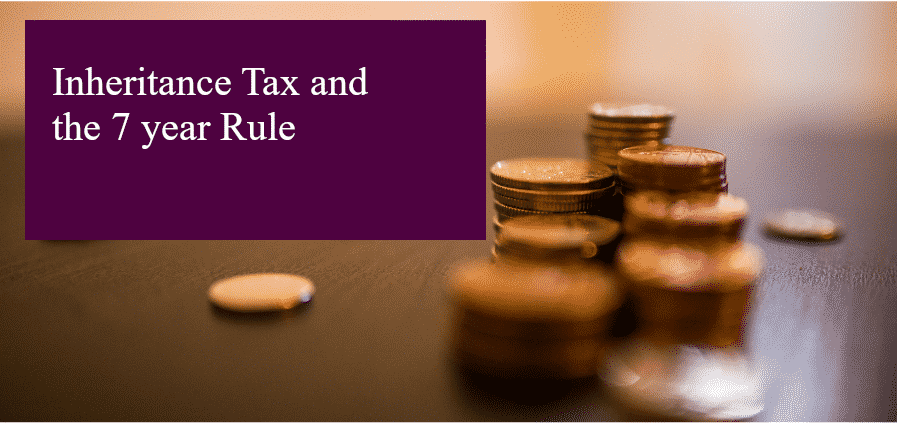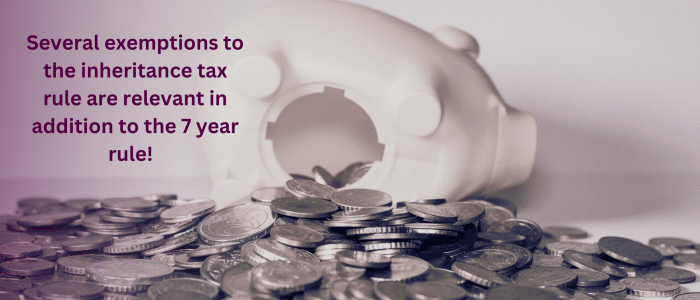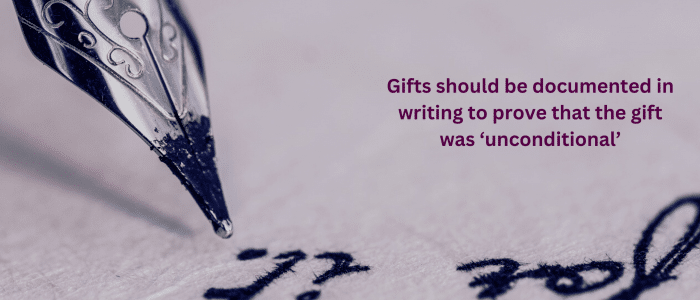The 7 Year Rule on Gifts & Inheritance Tax
David Cammack

Inheritance tax can have a big impact on the value of the estate that a person passes down when they die. For this reason, it is important to understand fully the 7 year rule if you are considering making a gift of money, property or another asset. So read on about Inheritance Tax and the 7 Year Rule.
Understand the 7 Year Rule on Gifts
Inheritance tax can have a big impact on the value of the estate that a person passes down when they die. For this reason it is important to fully understand the 7 year rule if you are considering making a gift of money, property or another asset.
On a side note, if you are looking to make a gift of significant value you should do it using a deed of gift, and our template will assist you in doing so cost effectively.
It is common for family members, and others to make gifts of property or money, and these gifts may be taxable and subject to the 7 year rule.
The 7 year rule on gifts applies due to the inheritance tax laws here in the UK. The rule states that if you give away assets as a gift and do not die within 7 years of making the gift then no inheritance tax is payable on the gift.
However, if you die within 7 years of making the gift then the value of the gift(s) is added back into your estate for the purpose of calculating inheritance tax. Let’s dive into how this works.
The tax law was brought in under Section 7 of the Inheritance Act 1984 to prevent people from avoiding inheritance tax by giving away their assets shortly before their death.
The subject is covered in detail on the Government website, and below we guide you through the key elements of the 7 year rule as it applies here in the UK.
The Basics of the 7 Year Rule

When considering the 7 year rule and its effect on the potential taxation of the gifts, whether they are of property or of money, there are several key matters to understand.
The first matter to understand is that gifts are considered to be Potentially Exempt Transfers (PETs). This simply means that any gift becomes exempt from inheritance tax if the person making the gift survives for 7 years.
Other exemptions also apply which we will look at below.
Exempted Gifts
The following gifts are excluded from the 7 year rule principle:
- Gifts to Spouses or Civil Partners: these gifts are always exempt from inheritance tax and so the 7 year rule does not apply to them. No tax is payable on gifts to Spouses or Civil Partners.
- Charitable Donations: Gifts made to registered charities are exempt, as again no inheritance tax is payable on these gifts.
- Gifts to Political Parties: Gifts to political parties are exempt under certain conditions. The Government provides detailed guidance on this if this is relevant to you.
Annual Exemptions
There are two annual tax allowances/exemptions that may apply and make the gift exempt from inheritance tax. These are:
- The Annual Gift Allowance: Every person has an annual gift allowance. As at July 2024 this is £3,000 per year. This means that fights made in any tax year that are less than £3,000 are tax exempt, even if the person making the gift dies within 7 years.
- The Small Gifts Allowance: Gifts that are less than £250 are exempt provided that it is the only gift made to the recipient of the gift in that tax year. This will often apply to small gifts of money.
People often ask how much money can you gift tax free. The answer is that in any one year a person can gift up to the tax free allowance tax free. After that limit is reached, the gift, unless exempt, becomes a potentially exempt transfer and subject to the 7 year rule.
Normal Expenditure out of Income Exemption
There is one further exemption, which people often overlook in articles or guides on the 7 year rule. This is the exemption in the Inheritance Tax Act for gifts that are classed as being ‘normal expenditure out of income’ for the person making the gift.
Essentially, if a person makes a gift to another person on a regular ongoing basis, usually to support the maintenance of that person, and the money comes from income they have received in that year then the gift is except. Therefore inheritance tax and the 7 year rule will not apply.
For this exemption to apply it is necessary to show that three elements apply. These are:
- That the gift was sufficiently regular that it formed part of the person making the gift annual expenditure.
- That the gift was made out of income that the gifting person received in that tax year.
- After making the gift the gifting person was left with enough money to cover their normal standard of living.
A situation where this exemption may be very useful is where a grandparent makes a regular gift to their child to pay for a grandchild’s education, or savings.
Section 21 of the Inheritance Act deals with this exemption. A good article on this exemption, for further reading can be found here.
Types of Gifts and the 7 Year Rule

An important concept to understand is that the tax law deems gifts to fall into one of two classes. These classes are:
- Outright Gifts; or
- Gifts with Reservation of Benefit.
The inheritance tax treatment on these two classes of gift is very different.
An outright gift is a gift that the giver makes without attaching any condition to it. In this instance, if the person making the gift dies within 7 years, this gift is a PET. So it is potentially taxable, subject to the 7 year rule.
A gift with reservation of benefit is where the person giving the gift retains some benefit from the asset. A common example is where a person gifts a property, but the giver retains the right to live in it rent-free.
Such a gift is not exempt from inheritance tax under the 7 year rule. You add back its full value into the estate of the person that made the gift, in the event of their death.
The above applies equally to gifts of money and to gifts of property.
Calculating Inheritance Tax

- a person’s estate at the date of their death; plus
- taxable gifts made within the last 7 years.
The first £325,000 of a person’s estate is not taxable (as of the 2023/24 tax year). This is known as the nil rate band allowance. After £325,000, the balance of the estate is liable for inheritance tax at 40% currently.
Taper Relief and the 7 Year Rule
A surprising number of people that talk to us about the 7 year rule are not familiar with the concept of taper relief, or how it applies to the 7 year rule in the UK.
Taper relief works so that for every year, beyond 3 years, that the person making the gift survives, the value of the gift reduces in the event that you have to add it back into the estate.
The table below sets out the tax reduction that applies for each year over 3 years. After 7 years the gift is fully exempt.
|
Years between Gift and Death |
Tax Reduction |
Effective Tax Rate |
|
0-3 years |
0% | 40% |
|
3-4 years |
20% | 32% |
|
4-5 years |
40% |
24% |
|
5-6 years |
60% |
16% |
| 6-7 years | 80% |
8% |
| 7+ years | 100% |
0% |
A common question where inheritance is payable is, who pays the tax under the 7 year rule. The answer is the estate of the deceased person that made the gift. This is because you add back the value of the asset to the estate of the deceased person. The beneficiary of the gift is not liable for the tax. The tax payable should reduce if the taper relief applies.
A Worked Example of Taper Relief and the 7 Year Rule
To assist in your understanding of the 7 year rule and taper relief consider the two examples below. They assume the estate has used up the full nil rate band allowance.
A Gift Made Within 3 years:
- The person makes a gift of £100,000 and then dies within three years. Then the tax rate is 40%.
- The extra tax payable as inheritance tax would be £40,000.
A Gift Made Between Years 3 and 7:
- The person makes a gift of £100,000 four years before dying. Taper relief will then apply.
- Based on the taper relief that will apply, the tax should reduce by 40%.
- This means the effective tax on the £100,000 should be 24%, so £24,000.
- But in fact the gift eats up your nil rate band first. So it eats that up as if it were liable to the full 40% rate.
Legal and Administrative Considerations

When making a gift, you should make sure you document it correctly. For any gift of a significant value we recommend putting in place a Deed of Gift and you can do this using our Deed of Gift Template.
Documenting the gift ensures that it is irrevocable and that it is clear that the gift is not conditional in any way, which otherwise could make it taxable.
When making a cash gift, we recommend keeping a copy of the bank statement with the deed of gift. This helps you to prove when you made the transfer.
If you make a gift of property or shares additional registration requirements will enable you to prove the date of the transfer. These considerations are important if the estate then has to rely on the application of the 7 year rule.
